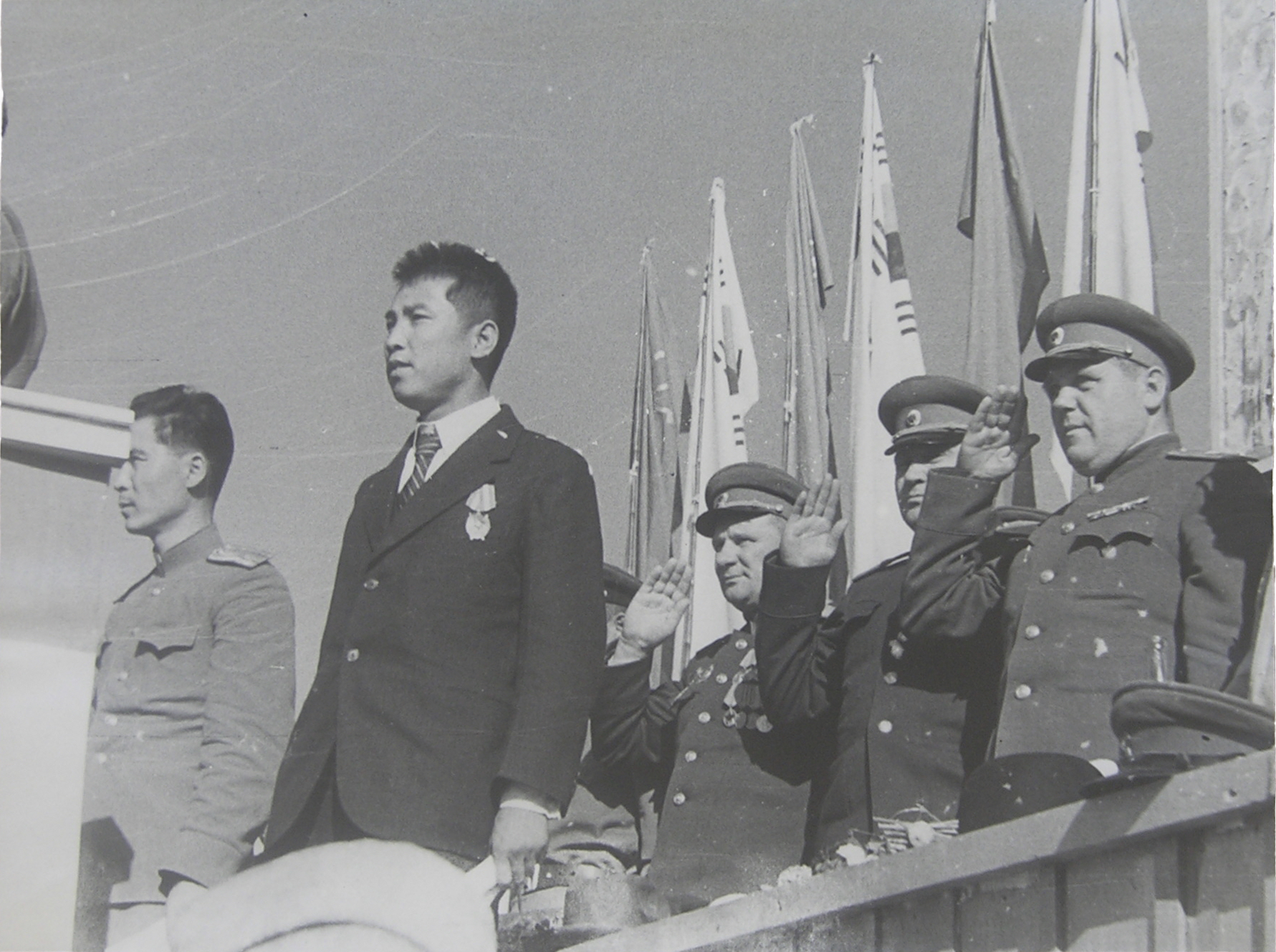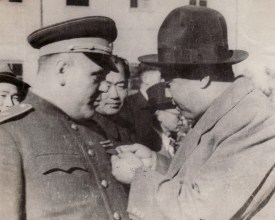Nikolai Georgiyevich Lebedev on:
[Wikipedia]
[Google]
[Amazon]
Nikolai Georgiyevich Lebedev ( Russian: Николай Георгиевич Лебедев; 3 December 1901 – 10 May 1992) was a Red Army major general. Lebedev served in both the Eastern Front and Soviet-Japanese War. He later served as head of the Soviet Civil Administration in Korea (present-day North Korea) from 1947 to 1948. He is considered as one of the founders of North Korea and the ruling Workers' Party of Korea.
 In 1924, he graduated from the Higher Military Pedagogical School and in the same year, he was appointed as a teacher of social studies at the Tver Cavalry School of the Comintern named after Leon Trotsky. In December 1927, he completed his post-graduate courses in social studies. Lebedev was appointed as an assistant to the head of the educational unit for party political work at the school of
In 1924, he graduated from the Higher Military Pedagogical School and in the same year, he was appointed as a teacher of social studies at the Tver Cavalry School of the Comintern named after Leon Trotsky. In December 1927, he completed his post-graduate courses in social studies. Lebedev was appointed as an assistant to the head of the educational unit for party political work at the school of  On 15 June 1941, he was appointed a member of the Military Council of the 25th Army. Following the outbreak of Operation Barbarossa in 1941, Lebedev was promoted to Major General in 1942. In 1944, he was awarded the
On 15 June 1941, he was appointed a member of the Military Council of the 25th Army. Following the outbreak of Operation Barbarossa in 1941, Lebedev was promoted to Major General in 1942. In 1944, he was awarded the  During his time as the head of Soviet civil administration in Korea, Lebedev directed several political initiatives to make Kim Il-sung, who was an unknown person at home, the leader of North Korea. Il-Sung Park, who taught Marxist-Leninist ideology to Kim at that time, testified that Lebedev was the first person to initiate the idolization and
During his time as the head of Soviet civil administration in Korea, Lebedev directed several political initiatives to make Kim Il-sung, who was an unknown person at home, the leader of North Korea. Il-Sung Park, who taught Marxist-Leninist ideology to Kim at that time, testified that Lebedev was the first person to initiate the idolization and 김일성 고향이 만경대로 알고 계시죠? 사실은요
/ref> Following his return to Soviet Union, Lebedev served as the Deputy Commander for Political Affairs of the Don Military District from August 1949 to July 1950. He served in numerous positions and assignments until his retirement from the military in 1966.
Лебедев Николай Георгиевич
* {{DEFAULTSORT:Lebedev, Nikolai Georgiyevich 1901 births 1992 deaths People from Kaluga Governorate Russian communists Burials in Troyekurovskoye Cemetery Soviet major generals Soviet military personnel of World War II Recipients of the Order of Lenin Recipients of the Order of the Red Banner Recipients of the Order of the Red Star Recipients of the Patriotic Order of Merit in gold Soviet military personnel of the Winter War Russian people of World War II People of the Soviet invasion of Poland Communist Party of the Soviet Union members Communist rulers Kim Il-sung
Early life
Lebedev was born in 1901 at the Buda village in Kaluga Governorate, to a peasant family. Until 1916, he studied at a zemstvo school and later attended a teacher's seminary inKozelsk
Kozelsk (russian: Козе́льск) is a town and the administrative center of Kozelsky District in Kaluga Oblast, Russia, located on the Zhizdra River (Oka's tributary), southwest of Kaluga, the administrative center of the oblast. Populatio ...
until 1918. In 1920, he joined the Communist Party of Soviet Union and began serving in the Red Army.
Military career
 In 1924, he graduated from the Higher Military Pedagogical School and in the same year, he was appointed as a teacher of social studies at the Tver Cavalry School of the Comintern named after Leon Trotsky. In December 1927, he completed his post-graduate courses in social studies. Lebedev was appointed as an assistant to the head of the educational unit for party political work at the school of
In 1924, he graduated from the Higher Military Pedagogical School and in the same year, he was appointed as a teacher of social studies at the Tver Cavalry School of the Comintern named after Leon Trotsky. In December 1927, he completed his post-graduate courses in social studies. Lebedev was appointed as an assistant to the head of the educational unit for party political work at the school of anti-aircraft artillery
Anti-aircraft warfare, counter-air or air defence forces is the battlespace response to aerial warfare, defined by NATO as "all measures designed to nullify or reduce the effectiveness of hostile air action".AAP-6 It includes surface based, ...
. In March 1934, he was appointed as the political commissar to the commander of the 45th Artillery Regiment. In November 1936, Lebedev was appointed as the head of the propaganda, agitation and press department of the political department of the Kiev Military District. From 1939, he served as the head of the Military-Political School at the Kiev Military District.
In August 1939, Lebedev was appointed head of the political department of the 49th Rifle Corps. As part of this unit, he participated in the Soviet invasion of Poland and the Winter War. For this, he received the Order of Lenin. In 1940, Lebedev was promoted to brigade commissar.
 On 15 June 1941, he was appointed a member of the Military Council of the 25th Army. Following the outbreak of Operation Barbarossa in 1941, Lebedev was promoted to Major General in 1942. In 1944, he was awarded the
On 15 June 1941, he was appointed a member of the Military Council of the 25th Army. Following the outbreak of Operation Barbarossa in 1941, Lebedev was promoted to Major General in 1942. In 1944, he was awarded the Order of the Red Star
The Order of the Red Star (russian: Орден Красной Звезды, Orden Krasnoy Zvezdy) was a military decoration of the Soviet Union. It was established by decree of the Presidium of the Supreme Soviet of the USSR of 6 April 193 ...
for good combat and political training of military units transferred from the 25th Army to the Western Front Western Front or West Front may refer to:
Military frontiers
*Western Front (World War I), a military frontier to the west of Germany
*Western Front (World War II), a military frontier to the west of Germany
*Western Front (Russian Empire), a majo ...
. In August 1945, Lebedev was one of the commanders of military operations of the 25th Army of the Far Eastern Front during the Soviet-Japanese War, which led to the liberation of the Korean Peninsula from Japanese rule.
Following the liberation of Korean Peninsula and the subsequent Soviet occupation of the northern part of Korean Peninsula, Lebedev was appointed as the head of the Soviet Civil Administration. He was in charge of carrying out the instructions from the top officials, such as Terenty Shtykov in Pyongyang.
 During his time as the head of Soviet civil administration in Korea, Lebedev directed several political initiatives to make Kim Il-sung, who was an unknown person at home, the leader of North Korea. Il-Sung Park, who taught Marxist-Leninist ideology to Kim at that time, testified that Lebedev was the first person to initiate the idolization and
During his time as the head of Soviet civil administration in Korea, Lebedev directed several political initiatives to make Kim Il-sung, who was an unknown person at home, the leader of North Korea. Il-Sung Park, who taught Marxist-Leninist ideology to Kim at that time, testified that Lebedev was the first person to initiate the idolization and cult of personality
A cult of personality, or a cult of the leader, Mudde, Cas and Kaltwasser, Cristóbal Rovira (2017) ''Populism: A Very Short Introduction''. New York: Oxford University Press. p. 63. is the result of an effort which is made to create an id ...
of Kim Il-sung.
For his efforts, Lebedev is considered as one of the founders of the Workers' Party of Korea. On 10 September 1948, he returned to the Soviet Union after the official establishment of the North Korean government. Kim invited him to North Korea every year since then./ref> Following his return to Soviet Union, Lebedev served as the Deputy Commander for Political Affairs of the Don Military District from August 1949 to July 1950. He served in numerous positions and assignments until his retirement from the military in 1966.
Later life
After his retirement, he lived a relatively long life. In 1988, he was involved and appeared in the Korean War documentary ''Korea: The Unknown War '' by Thames Television. Lebedev gave a lot of testimony to the interview team of South Korean newspaper '' JoongAng Ilbo'', who visited his home in Moscow in 1991. Andrei Lankov, a Russian scholar and specialist in Korean studies, writes in his book ''The DPRK Yesterday and Today: An Unofficial History of North Korea'' about his meeting with Lebedev:"I had a chance to meet with N. G. Lebedev in 1989 and 1990. During these conversations, I was amazed that, despite extreme old age, N. G. Lebedev retained a brilliant memory and a sharp, somewhat ironic mind, which contrasted sharply with his extreme physical decrepitude".Lebedev died in Moscow on 10 May 1992. He is buried at the Troyekurovskoye Cemetery. The memoirs he left are an important historical data related to the Soviet Civil Administration in Korea and the operation of the United States Army Military Government in Korea. There are many testimonies left in response to interviews by various people after the collapse of the Soviet Union.
Honours and awards
;USSR ;ForeignReferences
* * *Лебедев Николай Георгиевич
* {{DEFAULTSORT:Lebedev, Nikolai Georgiyevich 1901 births 1992 deaths People from Kaluga Governorate Russian communists Burials in Troyekurovskoye Cemetery Soviet major generals Soviet military personnel of World War II Recipients of the Order of Lenin Recipients of the Order of the Red Banner Recipients of the Order of the Red Star Recipients of the Patriotic Order of Merit in gold Soviet military personnel of the Winter War Russian people of World War II People of the Soviet invasion of Poland Communist Party of the Soviet Union members Communist rulers Kim Il-sung